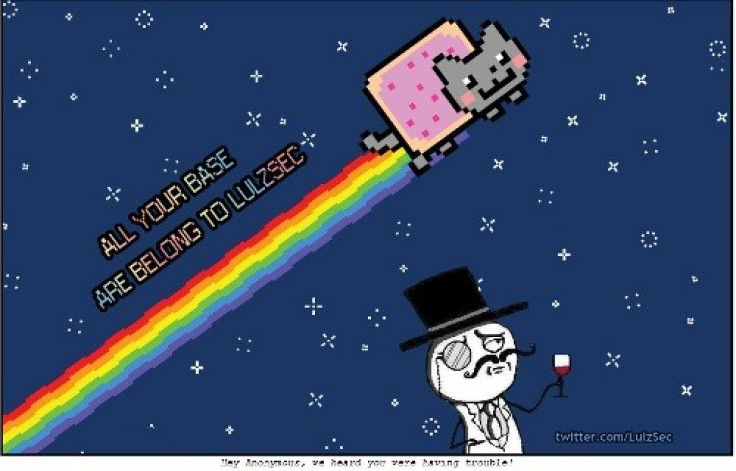Cyber security: 32 Anonymous members detained while LulzSec hack U.S. Senate and CIA

While members of the hacking collective Anonymous find themselves the target of an ongoing campaign against them, LulzSec continues its hacking escapades un-phased, claiming responsibility for cyber attacks against both the U.S. Senate and CIA.
LulzSec and the CIA
Most recently, the hacking collective LulzSec claimed responsibility for a successful cyber attack against the U.S.'s Central Intelligence Agency website.
As it has done in its previous hacks, LulzSec revealed the attack through a tweet on its Twitter page. In it the collective claimed to have managed to have brought down the CIA's website making parts of it inaccessible.
The tweet posted read, "Tango down - cia.gov - for the lulz". A subsequent tweet posted later in the evening elaborated, "Goodnight twitter. The CIA anti-lizards will probably rise from the packet sea while we rest our shining-yet-saturated power field arrays".
The CIA are yet to confirm whether LulzSec's claims are true. Thus far, all that has been said by the CIA is that it's "looking into" LulzSec's claims.
LulzSec's claimed attack against the CIA occurred just after the group opened up a telephone request line for "fans" to suggest potential targets. LulzSec has not yet revealed whether the cyber attack on cia.gov was done on request.
Although the CIA has not yet confirmed LulzSec's claims, its website was down for a period on Wednesday. Though this could also have been caused by the large amount of users trying to log-onto the site all at once to check the authenticity of LulzSec's claims for themselves.
LulzSec and the U.S. Senate
Before the reported attack on the CIA, LulzSec reported a similar attack on the public section of the U.S. Senate's website.
The Senate has since clarified that the group did not manage to breach the firewall protecting the more sensitive portion of the network.
The statement LulzSec subsequently posted indicated that the attack was designed to protest the U.S. government's recent policy of treating all cyber attacks in the same manner as a real-world attack:
"We don't like the US government very much. Their boats are weak, their lulz are low, and their sites aren't very secure. In an attempt to help them fix their issues, we've decided to donate additional lulz in the form of owning them some more!
"This is a small, just-for-kicks release of some internal data from Senate.gov - is this an act of war, gentlemen? Problem?"
Suspected Anonymous members caught
While LulzSec has had a busy week hacking both two high-profile U.S. targets, Anonymous -- the previous big-name in Hacktivism -- has suffered.
Most recently the Turkish authorities have targeted Anonymous for its cyber attacks against government owned websites.
Turkish authorities conducted raids across 12 of the country's cities, detaining 32 suspected Anonymous contributers in the process.
Since the initial reports, the Anatolia news agency has revealed that nine minors of the 32 arrested have since been released while the remaining 23 will continue to be detained for further questioning.
Just a few weeks earlier three suspects were arrested in Spain's Barcelona, Valencia and Almeria cities.
The three were arrested on suspicion of involvement in the collective's cyber attacks against the Spanish banks BBVA and Bankia and Italian energy group Enel SpA.
Anonymous went on to respond to the arrests by targeted the Spanish Police with another DDoS attack -- similar to those carried out in Turkey. According to the BBC the attack managed to knock the Spanish Police's website offline for around an hour.
In the U.K. six suspected Anonymous contributors have been arrested.
Five of the suspected members were caught after British Police raided their homes in January this year.
The sixth suspected Anonymous member was arrested on a separate raid carried out in April.
The six men were all arrested in connection with several offences under the Computer Misuse Act. They are all suspected of involvement in Anonymous' cyber attacks against Amazon, the Bank of America, Mastercard, PayPal and Visa's website.
Since their arrest all six have been released on bail and are due to reappear at police stations later this month.
How long until LulzSec are caught
Where Anonymous were previously seen as one of the biggest hacktivist groups out there, since the arrests of as many as 32 of its contributors, the collective's public persona has been damaged, with it no longer appearing untouchable.
Whether through an intentional strategy or mere luck of circumstance the hacker collective LulzSec has in many consumer and analysts eyes stepped-up-to-bat taking over Anonymous' top-spot.
In recent months the group's Twitter page jumped from around 100 followers to 166,467 demonstrating just how quickly the collective's public-profile has grown.
The group has led several high-profile raids not just against the Senate and CIA, but also the FBI and numerous games development and American broadcasting companies.
Yet, unlike Anonymous, LulzSec are yet to have any of its contributors arrested and the world still knows next to nothing about its size or structure.
As is the case with Anonymous, even if contributors are caught, they themselves will likely not know the size or hierarchy -- if there is any -- of the collective.
While the FBI as well as numerous other of the world's law enforcement agencies are investigating LulzSec it seems unlikely that they will be able to deal with the group in any permanent way.
At best, as has debatedly been done to Anonymous, law enforcement may hope to damage the group's public persona, taking small-victories in catching individual members.
© Copyright IBTimes 2024. All rights reserved.





